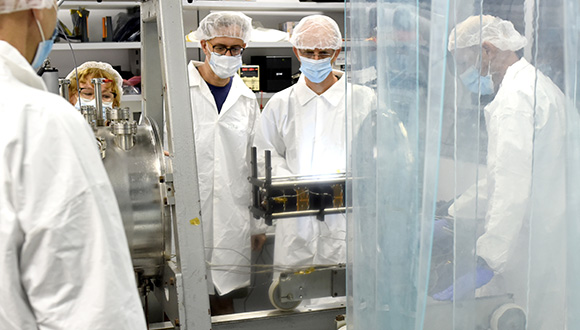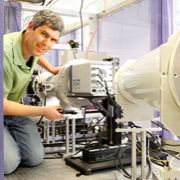Clear Your Mind
Busy cleaning for Passover? We’ve met with some researchers who are preoccupied with cleaning, not just before the holiday but throughout the year
A Glass of Water, Please!
Prof. Hadas Mamane, Head of the Environmental Engineering Program at TAU’s Faculty of Engineering would like for people in India to gain access to clean drinking water. Sounds simple enough? Sadly, it is not.
In India, open dumps are the most common method of disposing of municipal waste. The garbage is disposed in dumps without any management or treatment whatsoever, causing multiple environmental problems, the most serious of which is groundwater pollution by landfill leaching seeping into the ground.
Together with Prof. Mohan of IIT Madras in India, Prof. Mamane is looking for effective ways to prevent the contamination of groundwater and drinking water with runoff from open dumps in and around the city of Chennai, India, the fourth largest city in India.
"Safe potable water is a basic need. A suitable technology alone cannot solve water problems. We must also work together with the local society, so that the community itself is empowered by having potable water, and can independently manage its own water resources and make its own decisions. To create suitable conditions for implementing the technology we must also bring instruction and education, introducing introduce the environmental ideas around, water, energy, agriculture and food," explains Prof. Maman.
Clean the Room
The word ‘clean’ takes on a whole new meaning when it comes to the ‘clean room’. This room may well be the dream dwelling for any clean freak - there’s not a grain of dust under the furniture! Work in fields such as microelectronics, pharma, biotechnology, medical equipment and food all require a space where the amount of particles in the air is limited and kept under strict control.
On TAU campus, there are several clean rooms where researchers can carry out activities requiring a sterile environment. At the Faculty of Engineering, for instance, there are two clean rooms, in which small satellites are constructed and inspected before they can be launched into space. This is where all the inspections of TAU’s first nanosatellite, TAU-SAT1, took place before it soared into space in pursuit of the unknown.
Dr. Ofer Amrani heads the laboratory for small satellites at the School of Electrical Engineering. He explains that “The rooms are constructed with light metal and the ceiling has blowers and filters, ensuring high pressure of filtered air entering the clean room.” The sides of the room are tightly closed by a transparent Plexiglas, allowing for a peek into the room, or by means of a canopy made of vinyl sheets. The floor of the room is covered with a hard anti-static surface. Those entering the room are required to wear robes, gloves, special shoe covers and a suitable head cover. As long as all the rules are observed regarding entering and operating in the clean room, it remains clean for a long time.

Masks, gloves and head covers are musts in the clean room
Don’t Obsess!
A clean and tidy house is lovely, but sometimes the act of cleaning becomes problematic. An obsession with cleanliness is one of the most prominent signs of obsessive-compulsive disorder, OCD, a disorder that is considered very common.
Prof. David Eilam from the School of Zoology at the George S. Wise Faculty of Life Sciences studies animal and human behavior and is well acquainted with the disorder: “The cleaning takes on an excessive form. Cleaning clothespins, the thorough scrubbing of egg shells and, of course, daily cleaning of floors and constant and prolonged washing of hands until the skin peels off. “ For sufferers of this condition, Passover is when everyone else starts to act the way they always do. This was also the case in the beginning of the Corona crisis, when everyone made sure to wash their hands, wearing gloves, opening doors with the elbows, etc.
Prof. Eilam says that this illustrates that there is a continuum between normal and pathological behavior, and that obsessive cleansing is a caricature of normal behavior, i.e. the exaggeration of certain lines over others.
Ensuring cleanliness is meant to reduce patients' anxiety about infections that could harm them or their loved ones. In OCD, however, the act of cleaning disconnects from its initial purpose and becomes ritualistic behavior with a rigid structure that repeats itself. The performance itself becomes the goal. As with many compulsive behaviors, compulsive cleanliness gives the illusion of control and order as a counterweight against anxiety, which stems from uncertainty and perceived lack of control.

Organize Your Mind
Let us conclude with a few recommendations from Dr. Ricardo Tarrasch from The Jaime and Joan Constantiner School of Education who researches dealing with stress and the impact of meditation and mindfulness on a learning environment. Perhaps he can help us return to studies and work with a cleaner state of mind after the Passover holiday?
- Are you working towards a deadline? Set it yourself, one week before the actual deadline. “I often hear students say that they worked on an assignment for months, but that they did not have time to proofread before they delivered. That’s a pity.” Dr. Trash says that this minor adjustment can make the work itself more pleasant and also upgrade the execution of the task. Worth trying.
- Have A LOT of assignments? Organize them on a list and start executing them, one by one. “Most of the time, we are busy doing several things at one, something we are not really capable of doing. What are actually doing, is going back and forth between various tasks. A habit it is worthwhile changing. That way, we become free to focus more and to do things more precisely. And the process becomes more enjoyable.”
- Try practicing mindfulness: “The goal is to become more aware of what is happening with us, both externally and internally; observe how we speak, move, interact with others and to be as focused as possible in our presence. Our body signals to us when it is in distress, and often we are not attentive to it. When we’re dealing with what is going on in this particular moment, we can decide how to act according to our abilities and according to our personal ethics – and work less on autopilot. This way, we become more aware of the stress which is harmful to us and can find ways to reduce it, even on a physical level. When we are stressed, our breathing changes. It becomes shallower and quicker, and it feels like we’re being chased, although no one is really chasing us. Becoming aware of this, and slowing down our breathing, helps us become calmer.”
“Peeking into our consciousness is fascinating. The more we practice it, the more we become aware of where our attention is at any given moment. Mindfulness is a great help for us to notice where our attention is directed and to train it.”






